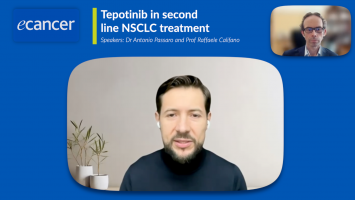What was your talk about?
I’m going to be presenting on the update at ASCO 2023 regarding the predictive and prognostic biomarkers of immunotherapy in non-small cell lung cancer. The most relevant aspect I would highlight today is that we are seeing a shift in the way we perceive biomarkers of response. We know that PD-L1 expression in the tumour is probably not the best biomarker that we can have, although it’s the only one that we currently use for predicting potential benefit to immunotherapy.
There were some presentations regarding other potential biomarkers that we might be using in the future. Node2 is another interesting biomarker of benefit to immunotherapy, not only for non-small cell lung cancer but many other tumour types. It was an interesting presentation regarding the potential use of this biomarker in our patients.
Again, we also saw another interesting presentation regarding the tumour mutational burden. In this case there was a very nice trial studying more than 8,800 patients with different tumour types. They looked at the TMB in order to find the proper cut-off in which we could consider high versus low TMB for prediction of benefit to immunotherapy. 10 mutations per megabase seems to be the proper cut-off if you look at different tumours. Regarding non-small cell lung cancer, most of the patients actually had low or intermediate TMB and only around 25-30% of the patients actually achieved more than 10 or 20 muts/Mb and that seemed to be very well associated with overall survival and potential benefit to immunotherapy in general.
There was also another interesting abstract that was presented regarding the different biomarkers that could be used of benefit to immunotherapy in small-cell lung cancer presented by Charles Rudin. That was a negative trial, actually it was shocking to see how in the control arm those patients not receiving immunotherapy seemed to have more benefit using those potential predictive biomarkers than those patients receiving immunotherapy. So that was considered to be a negative trial.
Finally, I would also highlight two other important presentations, more from the educational point of view, looking at all the different biomarkers combined together and how we should try to design new clinical trials based on a new biomarker development approach. The way would be to really consider what patient selection can be done for the maximum benefit to immunotherapy in non-small cell lung cancer.








